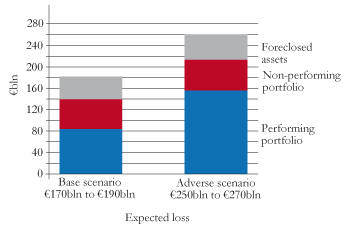US-based Oliver Wyman and German strategy consultant Roland Berger published their much-anticipated stress tests of Spain’s banks on June 21.
The studies were undertaken in an attempt to quell mounting speculation as to the true health of the sector. The banks were stressed under base and adverse scenarios with the aim of coming up with essentially a worst-case scenario.
The adverse scenario entailed two consecutive years of severe economic recession with real GDP declines of 4.1% and 2.1%, and unemployment rates at 25.1% and 26.8% in 2012 and 2013 respectively. Real-estate prices fall 20% and land prices 50% for a total peak-to-trough fall by 2014 of 37% and 72% respectively.
| Spain's looming losses |
| Expected loss forecast 2012-14 |
 |
| Source: Oliver Wyman |
Roland Berger determined that under an adverse scenario the banks would require a recapitalization of €52 billion to maintain a core tier 1 target ratio of 6%. In this scenario, the largest three banks, Santander, BBVA and CaixaBank, do not require recapitalization.
Oliver Wyman deemed the situation slightly worse, necessitating a €62 billion recapitalization, and calculated cumulative expected losses for the existing credit portfolio to reach around €250 billion to €270 billion under the adverse scenario and around €170 billion to €190 billion under the base scenario.
